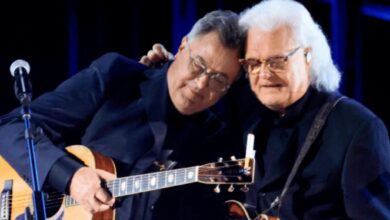American Idol star MKY stuns fans with a silky Spanish performance, drawing comparisons to the next Ritchie Valens
MKY’s heartfelt rendition of “Sabor a Mí” on American Idol in 2025 captivated audiences nationwide, marking a significant moment in the show’s history. Performing entirely in Spanish, MKY paid homage to his Mexican heritage, bridging cultural divides and showcasing the timeless appeal of Latin music.
Born and raised in East Los Angeles, MKY grew up immersed in a rich tapestry of musical influences. The vibrant Chicano culture of his neighborhood, combined with his family’s deep-rooted love for traditional Mexican music, shaped his artistic sensibilities. From an early age, MKY displayed a natural talent for singing, often serenading family gatherings with classic boleros and rancheras.
“Sabor a Mí,” a bolero written by Mexican composer Álvaro Carrillo in 1959, has been cherished for decades for its romantic lyrics and melodic elegance. The song’s enduring popularity made it a bold choice for MKY, who sought to introduce this classic to a new generation while honoring its storied past.
In preparing for his performance, MKY collaborated closely with American Idol’s musical director to craft an arrangement that remained faithful to the original while incorporating contemporary elements. The instrumentation featured traditional guitar work complemented by subtle modern rhythms, creating a soundscape that resonated with both young and old listeners.
The performance was met with widespread acclaim, earning MKY a standing ovation from both the audience and the judges. Social media buzzed with praise, with many viewers expressing appreciation for the cultural authenticity and emotional depth he brought to the stage. While specific chart performance data is not applicable in this context, the impact of his rendition was evident in the surge of online streams and downloads of “Sabor a Mí” following the broadcast.
MKY’s interpretation of “Sabor a Mí” played a pivotal role in highlighting the richness of Latin music within mainstream American media. By performing in Spanish on a national platform, he challenged industry norms and encouraged greater inclusivity, inspiring other artists to explore and celebrate their cultural roots.
This performance marked a turning point in MKY’s career, leading to invitations to perform at prominent Latin music festivals and collaborations with established artists in the genre. His ability to authentically convey emotion across cultural boundaries expanded his fan base and solidified his reputation as a versatile and sincere artist.
The success of MKY’s “Sabor a Mí” also influenced his contemporaries, prompting a renewed interest in classic Latin songs among young artists. This resurgence contributed to a broader appreciation of Latin music traditions and encouraged the blending of genres in innovative ways.
Notably, MKY’s rendition drew comparisons to the legendary Ritchie Valens, another East L.A. native who bridged cultural gaps with his music. While Valens’ “La Bamba” introduced Mexican folk music to rock and roll audiences in the late 1950s, MKY’s “Sabor a Mí” brought traditional bolero to the forefront of contemporary pop culture, highlighting the enduring influence of Latin music in America.
Around the time of this performance, MKY was navigating personal challenges, including the recent loss of a close family member. This emotional backdrop added depth to his delivery, as he channeled his grief into a poignant and heartfelt performance that resonated with many viewers.
The legacy of MKY’s “Sabor a Mí” endures, with the performance frequently cited in discussions about cultural representation in mainstream media. It remains a touchstone for aspiring artists seeking to honor their heritage while reaching diverse audiences.
By embracing his roots and sharing them on a national stage, MKY contributed to a broader movement of cultural appreciation and fusion in music. His performance demonstrated the power of authenticity and the universal language of song, paving the way for future artists to explore and celebrate their identities through music.
In the years following, MKY received numerous accolades recognizing his contributions to music and cultural representation. These honors underscored the lasting impact of his “Sabor a Mí” performance and his role in shaping a more inclusive musical landscape.
Reflecting on MKY’s journey, it’s evident that his rendition of “Sabor a Mí” was more than just a performance; it was a statement of identity and a bridge between cultures. His heartfelt delivery and commitment to authenticity left an indelible mark on the music industry, reminding us of the power of embracing one’s heritage and sharing it with the world.





